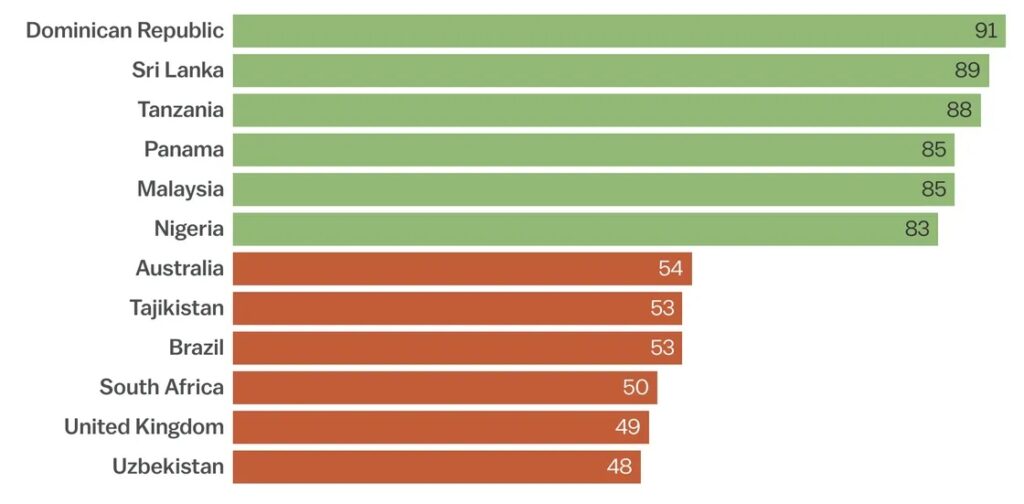Quantifying the mental health of an entire planet seems like an impossible task, but that's exactly what he's doing Sapien Labs with his ambitious Global Mind Project. Through a survey called Mental Health Quotient, which has reached over 400.000 people in 71 countries, the project not only provides an annual overview of global mental well-being, but also seeks to identify the root causes of psychological distress in modern societies.
The findings draw a map of the “factors of madness” and raise urgent questions about how to direct progress towards the common good, to protect our fragile psyche in the age of modernity.
A “do-it-yourself” experiment becomes a global project
It all started with a simple question: What is modernization doing to our brains? in 2014, the neuroscientist Tara Thiagarajan ran a microfinance company in rural India, and decided to conduct a do-it-yourself experiment using a portable EEG headpiece. Comparing the brain activity of him and his colleagues, exposed to "modernity" all their lives, with that of people who have spent their lives in small Indian villages, he found surprising differences. As if their brains had taken different, very different paths.
This discovery pushed her to investigate further, and after another 6 years to found Sapien Labs and launch the Global Mind Project, with the aim of understanding the impact of modernization on mental health on a large scale.
A quotient to measure the mental health of the planet
The heart of the project is the Mental Health Quotient (MHQ), a quotient that summarizes 47 aspects of mental health into a single score on a scale of 1 to 300 points, from “struggling” to “thriving.” And how has the world's mental health fared?
in 2023, out of 71 countries, the global average was 65, indicating that we are all “managing” the situation, but just above the “tolerance” level. Compared to 2019, the mental well-being score fell by 8%, with 44% of young adults at clinical risk, compared to only 6% of those over 65. An alarming figure that suggests how modernity can be particularly harsh for the new generations.
If you want to read the entire interesting report just released, you find it here.
The usual suspects: smartphones, junk food and families in crisis
What are the "madness factors" suspected of having triggered this malaise? The Global Mind Project has been investigating several possible culprits, starting from smartphones (someone said it). According to Thiagarajan, “the younger you are when you get your smartphone, the worse off you will be as an adult,” with consequences concentrated especially on young women.
Another suspect is ultra-processed food (someone said it), made with substances that would rarely be found in a home kitchen. Eating them multiple times a day triples the risk of serious mental health problems, regardless of exercise or income.
Finally, there is the crisis of family relationships: where bonds are stronger and more numerous, as in societies less exposed to modernity, mental health is better.
“Perceived” happiness and mental health, rankings reversed

Curiously, if you compare (do it) the mental health ranking with the World Happiness Report, which measures perceived happiness, many results are reversed. Countries like the Dominican Republic, Sri Lanka and Tanzania, which rank at the top for mental health, are at the back of the pack for happiness.
How come? According to Thiagarajan, the key is to distinguish between “feeling” and “functioning”. In summary you may feel great, but function poorly in the world. The MHQ, the quotient developed by the Global Mind Project, tries to capture both aspects based on on the definition of mental health, which includes the ability to contribute actively or productively to society.
A call to action
As modernization progresses, it seems we are sacrificing our mental well-being on the altar of progress. But it doesn't have to be this way. As Thiagarajan points out, what matters is the "direction" of growth and whether it is oriented towards the common good. At the moment, however, “growth is causing damage”. To reverse the trend, targeted actions are needed, starting with more stringent regulation. “If it's a free-for-all,” warns the neuroscientist, “people will take the easy shortcut to short-term profits at the expense of mental health.”
An epochal challenge
The Global Mind Project presents us with an epochal challenge: rethinking our development model to put psychological well-being at the centre. It is not a question of denying progress, but of directing it towards more humane objectives. Because if there is one thing that the data clearly tells us, it is that happiness is measured neither in GDP nor in likes on Instagram.
It is measured in the quality of our relationships, in the healthiness of our food (e.g of our cities, I add). And it certainly measures up in the balance between work and private life. All things that the frantic rush towards modernity risks eroding, leaving us more connected than ever and yet increasingly alone and fragile.
Perhaps, to find serenity again, we should take inspiration from those countries at the bottom of the happiness ranking but at the top of the mental health ranking. Countries where smartphones I'm not an obsession, where food is still a shared ritual, where family is a safe haven rather than an optional. Countries which, despite all their problems, seem to have found a more human balance between tradition and modernity.
Who knows if that isn't the real secret to happiness. Or at least mental health in a world gone mad.


